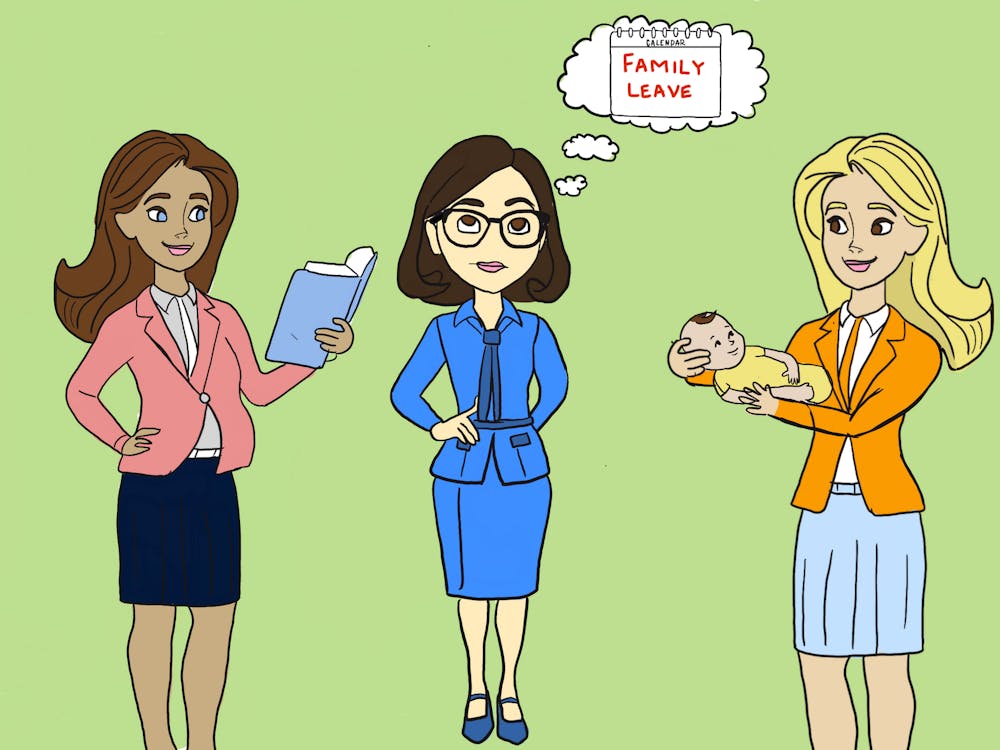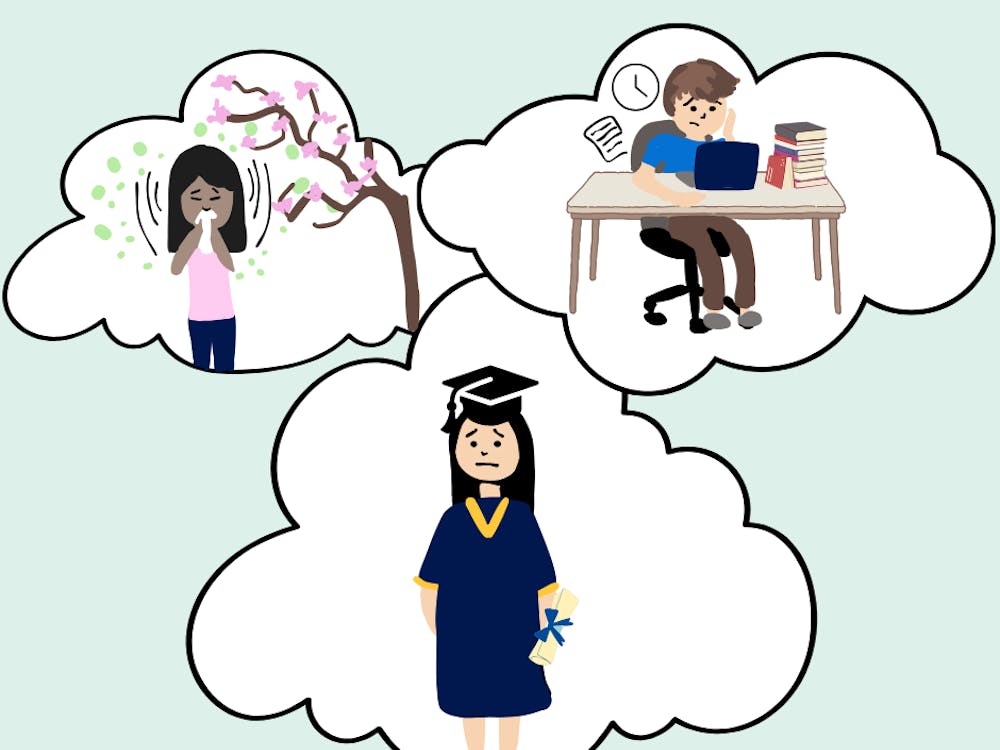The loss of someone we love is always difficult to deal with, especially when that person was still on the verge of realizing his potential.
The University sustained two such losses in June, one a recent alumnus and one a current student. A 2000 College graduate, Humayun Khan, was killed while serving in Iraq on June 8 and fourth-year College student John Steve Catilo died June 25 in a drowning accident.
Dr. Russ Federman, director of Counseling and Psychological Services at Student Health, said not only can the grieving process in cases such as these be more difficult because person we grieve for is young, but also because many of those grieving are young themselves.
"We each grieve in our own way," Federman said. "Since mortality is a given, as we get older our experience of mortality accrues. The earlier a death occurs, the less experience you have at managing your grief."
Federman said the experience of grief can be more destabilizing for college-age students than older adults.
"For a couple of days you may feel like your world is upside down," Federman said. "Freshman and sophomore year students are still not tuned into mortality. They feel that time stretches longer, that they won't have to deal with the end for a very long time. When we are painfully reminded of mortality, it's a shock to our consciousness. There's a thought of 'I am a mortal being, and just as he died yesterday, I could die tomorrow.'"
Friends of Khan and Catilo said their losses are especially difficult because both men were each such exemplary people.
'Perils of the spirit'
Captain Khan was killed when Jordanian suicide bombers detonated a car bomb in front of the forward supply base where Khan was stationed.
According to 2002 College graduate Eston Melton, a friend of Khan's, Khan was welcoming Iraqi workers to the base in the morning when he noticed a suspicious car approaching. He ordered his men to get to safety and then approached the vehicle, signaling it to stop. The bombers detonated the explosives, killing themselves and Khan. Had the car entered the base, the causalities would have been high.
"He died a hero, preventing the deaths of many other people with his actions," retired Lt. Col. John Dean said. "I can just picture him doing that very selfless service."
Dean was the Army ROTC commanding officer while Khan was in the program at the University. He retired in 2000, the same year Khan graduated and was commissioned.
"My impression of him was that he was an excellent young man who was very motivated and cared a lot about other people," Dean said. "He was willing to bend over backwards to do what he could for others."
Army reservist Melton remembers Khan as a consummate soldier.
"He just really struck me as a really well-grounded fellow. He had a great sense of humor," Melton said. "He knew how to be all business and professional, but when it was time to relax he was able to make that change."
Melton said Khan's heroic actions prove that American military office training is top-notch, despite recent events such at the prisoner abuse at Abu Ghraib.
"Khan put himself on the line for his men -- something that all of us officers are trained to do but all of us wonder if we'll be able to do it," Melton said. "Khan did exactly what he was trained to do. All of us appreciate what he did."
1998 College graduate Mark Rogers, who knew Khan through the ROTC program, agreed that Khan's actions were consistent with his training and his personality.
Rogers met Khan at the University but got to know him better when both were later stationed at Fort Knox.
"He was a very good cadet," Rogers said. "Lying in a puddle at three o'clock in the morning fending off an imaginary enemy, he always had a really good attitude about everything. Something so important in the service is to lead the way enthusiastically, because that's how people are going to follow you."
Mary Byrd, secretary to the University's Army ROTC, noted that Khan made a particularly relevant statement upon leaving the program.
Each year, Byrd creates a memento board made of statements and pictures of each graduate as they are commissioned.
Khan's statement focused on the human side of the army, foreshadowing the sacrifice he would make for fellow personnel.
"What I found most valuable in ROTC is people. I enjoyed working with our cadets. My source of happiness is friendship. I've found success not a harbor, but a voyage, with its own perils of the spirit. The game of life is to achieve that which you set out to do. There is always danger of failing. The lesson that most of us on this voyage never learn, but can never quite forget, is that to win is sometimes to lose. Don't lose sight of your humanness. The Army is about people," Khan wrote.
'A natural'
Similarly, Catilo's work ethic and positive attitude are two of the qualities his friends mourn the most.
Two instructors who worked with Catilo in Myo Sim Kendo, a Japanese martial art form, said he was not only one of their most talented students, but also one of the most amazing people they knew.
"He was one of my favorite people in the universe," said Christian DeBaun, a Kendo instructor who worked with Catilo in Charlottesville. "He was a really likeable guy. A little bit shy in the beginning, but one of the most pleasant and polite people I ever knew."
DeBaun said Catilo was also an extremely gifted athlete.
"Kendo is traditional Japanese sword, kind of like in the movie 'The Last Samurai,'" DeBaun said. "We often get people who are very physically fit. John Steve was in superb shape; he almost had a body like a weight lifter. Often people with that body type don't make very good martial arts students, but he was the rare exception. Like Bruce Lee. A natural."
Timothy Shanahan, who instructed Catilo in northern Virginia, agreed that Catilo was extremely talented.
"This past May he got a second-degree black belt in Kendo," Shanahan said. "He was probably one of the best students we had, and a great teacher."
Shanahan said one of the most impressive aspects of Catilo's martial arts performances was his grace.
"One of the things I will remember was watching him spar -- it's full contact, but he was graceful," Shanahan said. "He had such a presence about him. He radiated energy, and he was fluid. He was the only one of us who had hair long enough to have a top knot, so we joked that he was the only one of us who looked like a real samurai."
Shanahan also remembered Catilo's unique attitude about martial arts combat.
"He had this infectious smile," Shanahan said. "He'd get that big grin on his face when I was fighting him and that's all I could see, was the grin. I couldn't help but smile."
Shanahan said Catilo was dedicated to learning and teaching Kendo, and that he lent that passion to everything he did.
"With regards to his school and other activities, he never just did anything, he attacked everything," Shanahan said. "There were some things we didn't know until we attended his service. For example, he was an incredible artist."
Shanahan also said Catilo was an example to everyone he knew.
"As much as I taught him about technique, he taught us about being a better person -- he never sought to do that, he was just being himself -- you couldn't help but emulate him in that sense," Shanahan said. "We're all hit very hard by this. It's one of those tragedies, especially with John Steve. I can't even begin to fathom what his parents must feel. He was the type of individual who when you plan, he's what you want your children to grow up to be. Intelligent, and he worked so hard."
DeBaun thinks Catilo would have continued with Kendo for the rest of his life.
"He was a dear sweet lovely person who will be greatly missed by everyone in our club," DeBaun said. "He was unforgettable."
Memorials
Friends of Catilo and Khan have taken steps toward formally preserving their memories.
Federman said such memorials can be an important part of the grieving process.
"Some people prefer to grieve in a private way. For others, a more formal process may be helpful," Federman said. "It's something they should do if they feel it will be helpful to them. We each do our own thing to memorialize someone we care about."
Dean said Khan will be commemorated in Iraq for his heroic attitude toward his fellow man.
According to Khan's father, the gate where he was killed will be named after Khan.
"Humayun created a program over there to reach out to Iraqi children," Dean said. "They didn't call him 'the captain,' they called him 'our captain.' His commanding officer said he had never seen as many Iraqis come out to remember a U.S. soldier as they did for 'our captain.' They will name a gate for what he did to save other lives."
According to Lt. Col. Hampton Hite, current chair of the University Army ROTC, Khan will be honored in a memorial service on Sept. 21.
The new ROTC Cadet Center, now located on the corner of McCormick and Alderman Roads in the Astronomy building, will also be named in honor of Khan.
DeBaun hopes to do something to commemorate Catilo's contributions to the Myo Sim Kendo club.
"At the present time we're toying with the idea of doing some sort of memorial fund or scholarship fund," DeBaun said. "We'll try and find someone who exemplifies the qualities that John Steve had and give them free training. He'll stay in our club as a strong presence for the foreseeable future."
2004 College graduate Jennifer Zamora, who knew Catilo through the Organization for Young Filipino Americans, said that group will also memorialize Catilo. They are planning a vigil for the fall, and also possibly a basketball tournament in memory of Catilo and another student.
Catilo "was a very active member," Zamora said. "He was really genuine. He was always there for people, never left anyone behind."
Federman said while early experiences of grief can be intense, the process is healthy and should not necessarily cause concern.
"It's not uncommon that the initial grief reaction can be destabilizing," Federman said. "I try to normalize even strong grief reactions. Give it some time. If after two, three, four weeks the impact isn't evolving and you still feel off-balance, then seek professional help."






